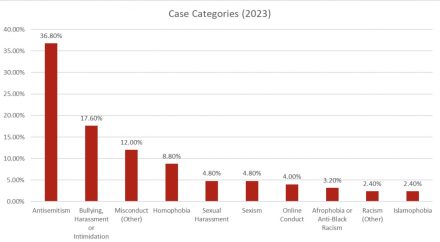
Three Labour-elected MPs have been in limbo with the whip suspended for at least eight months, others have quit before even longer investigations wrapped up and dozens of current members have reportedly been suspended for more than 18 months.
The suspensions have prompted fresh scrutiny of Labour’s processes, which had already faced criticism in an independent review the party itself commissioned by lawyer Martin Forde.
Forde claimed this week that some more left-wing MPs feel that disciplinary action taken against them moves “rather slowly” compared with those in the “right faction of the party,” and said the party should reassure members and voters that people “will be treated fairly”. Labour leader Keir Starmer said in response on Tuesday that it “made no difference where somebody stands in the Labour Party”.
Labour’s disciplinary system is also said to have come under fire from a senior party figure at its own governing body meeting behind closed doors last month.
National executive committee member Ann Black claimed that some disciplinary cases were “still taking far too long”, according to her report on the meeting, though some party insiders told LabourList cases could be complex and emphasised individuals should follow party rules.
Suspended MPs and candidates in the spotlight
A group of independent MPs who were elected as Labour in 2019 but have since lost the whip are also back in the spotlight, with Kate Osamor swelling their ranks at the end of January after accusing Israel of genocide in remarks marking Holocaust Memorial Day. She later apologised for “any offence caused”.
Now former Rochdale candidate Azhar Ali is also set to join them if elected in a by-election later this month, as the party’s withdrawal of support and suspension of his membership over his alleged comments on Israel and Jewish people came too late to change ballot papers. He has apologised for his own “inexcusable” comments. A second prospective parliamentary candidate for the general election was suspended and placed under investigation on Tuesday too over comments about Israel.
Meanwhile Christina Rees recently had the party whip returned to her and her party membership restored, after it was withdrawn more than a year ago reportedly over a bullying claim.

Many of the group – whose cases range from controversial comments to alleged inappropriate behaviour to undisclosed issues – have faced suspensions of many months, with some lasting more than a year. Two subsequently quit the party before their cases were even resolved, with both condemning the disciplinary process.
Diane Abbott’s suspension has now lasted almost 300 days – or more than nine months. She told LabourList recently that she suspected the party of using the disciplinary process to “bar me from standing at the next election”, despite her being selected by local members.
“I wrote in September that my suspension was a factional manoeuvre aimed at silencing a Black woman on the left, a critic of the line of the current leadership. Nothing has substantially changed since.”
She has also previously claimed there was “no investigation” and that Keir Starmer’s swift public suggestion that her remarks were antisemitic undermined it.
Abbott had the party whip suspended in April last year for suggesting in a letter to The Observer that Irish people, Jewish people and Travellers “are not all their lives subject to racism” as Black people are.
Abbott apologised and said she wished to “wholly and unreservedly withdraw” her remarks, which caused a significant backlash. A party spokesperson called the remarks “deeply offensive”.
One former MP, who said they “mostly never agreed with her politics”, called the length of time taken to investigate the letter “inexplicable”, other than as an attempt to “run the clock down”. They called it “no way to treat the party’s first elected MP of Jamaican descent”.
But a party spokesperson previously said the party expects “the highest standards of behaviour from its elected representatives, and has introduced an independent complaints process to investigate cases”. They also said Labour would not give a “running commentary on ongoing investigations”.
One MP suspended from October 2022 to February 2024
Abbott appears keen to avoid the fate of Rees, who was blocked from re-standing last summer while awaiting the outcome of her disciplinary case.
Rees had faced one of the longer suspensions among recent Labour MPs. Around 480 days had passed from when it was first reported that she had lost the whip to when it was restored, though the suspension may have been even longer.
She confirmed she was cooperating with an investigation at the time after a complaint, but said she was unaware of the details. The Guardian claimed it related to alleged bullying.
Rees apologised in a statement to The Guardian following her reinstatement and said she had “taken a number of steps to ensure that my future conduct is of the highest standard”. She also announced that she does not intend to seek reelection. She did not respond to LabourList’s request for comment.
Some MPs quit party before probes wrap up
Nick Brown also appears to have faced one of the longer suspensions in recent years, but quit the party last December some 461 days after he was first reported to have lost the whip.
He referred LabourList to his last statement, which alleged the disciplinary process he had faced was “fundamentally and inexcusably flawed”, open to abuse and risked eroding members’ confidence in the system.
The details of the case against the former chief whip are not known, but Brown himself said they were “very serious and it was important that they were looked at properly”. He claimed they were “entirely false”, however, and a former colleague said his situation was “sad to see”.
A party spokesperson told The Guardian last year that the party “treats all complaints with the utmost seriousness”, and its independent process “ensures complaints are decided impartially and fairly”.

Conor McGinn – a former deputy national campaign coordinator – also quit the party last year, with the case that triggered his suspension unresolved after at least 300 days. He was first reported in December 2022 to have lost the party whip following a complaint.
According to local paper the St Helens Star, he announced he had withdrawn from the investigation in October, alleging that it had been “a flawed, protracted and prejudicial process”.
Details of the complaint are similarly not public, but a Labour spokesperson told the St Helens Star the party took “action in response to every complaint” and treated them seriously. McGinn has called the complaint “unfounded” and said no wrongdoing had been found.
Meanwhile Geraint Davies has now been suspended for nearly 260 days over accusations of inappropriate sexual behaviour, which he has said he did not “recognise”.
Bambos Charalambous – who was first reported to have lost the whip just days after Davies following a complaint about his conduct – has also now been sitting as an independent for a similar period.
Some members suspended for more than 18 months
In some cases, MPs have their Labour Party membership suspended in addition to losing the whip.
Forde was commissioned by Labour itself to write a report on the party, partly to help improve a disciplinary system he dubbed “historically… not fit for purpose”.
Forde’s report explicitly voiced concerns about “lengthy administrative suspensions” persisting, even as the party strived to improve its processes in more recent years leading up to the report.
He also explicitly urged the party to wrap up complaints within nine months, other than in “exceptional” cases.
Some member suspensions have dragged on further than Forde’s recommended nine-month limit. According to Black’s account of the latest NEC meeting, 130 party members are currently suspended, with more than 45 suspended for more than 18 months.
Party rejects ‘arbitrary time limits’
While Labour says it has implemented most of Forde’s wider recommendations, it rejected his nine-month limit, however.
A document on Labour’s response states: “Caution needs to be expressed with arbitrary time limits for all complaints, given certain types of complaints take longer to investigate than others (for example, sexual harassment complaints take longer than a complaint relating to a single tweet).
“Accordingly, we do not recommend one time limit for all types of complaints.”
Party documents suggest over a third of cases handled by NEC panels last year involved antisemitism, with bullying, harassment or intimidation making up 17.6%, other misconduct 12%, sexual harassment or sexism 10%, homophobia 9%, other racism 6%, online conduct 4% and Islamophobia 2%.

Many cases ‘extremely complex’
One Labour insider told LabourList that some lengthy suspension cases were “extremely complex”.
They also argued that the number of suspended and under investigation is “not really huge” given the party has more than 375,000 members.
Black also said that while most current cases were “under investigation or awaiting an NCC or ICB hearing”, suspended members in a third of cases had “failed to complete training required by the NEC”.
Another insider told LabourList disciplinary cases can take a “really long time” for a variety of reasons, noting that some complaints will involve multiple witnesses, lots of interviews and paperwork, and the use of barristers on both sides.
They said some complaints can be very serious and possibly criminal matters, and warned time limits were potentially open to abuse.
They acknowledged that long-running processes were “not ideal” either for the party or the subject of the investigation, but claimed: “In general, it’s got better.”
Processes have improved, but party warned of legal risks
Forde himself also agreed the party’s processes have gradually improved since 2015, when he said it had a “substantial backlog” and “no comprehensive system” for logging complaints and even knowing how many cases existed or their stage.
The party was also not “able to cope” at the time with a “sharp increase” in complaints as membership soared under Jeremy Corbyn’s leadership, Forde said.
The second party insider also argued that people “should behave themselves better” – and MPs should consider the potential impact of disciplinary cases on their ability to stand for election before making statements.
But the former Labour MP critical of how long MP probes have taken warned the party should “not assume that the way it handles things is immune from legal challenge”.
“It’s really important that any political party follows due, fair and expedient process…Should this continue, the party could be challenged in court. And that would not reflect well on us at all.”
Labour and the suspended politicians named in the piece were contacted for comment.



More from LabourList
Humza Yousaf woes deepen as Labour files no-confidence vote in government
‘History and poll leads suggest Labour can be bolder, even if it costs some votes’
Labour warned ‘ethical foreign policy’ inevitably sparks charge of ‘hypocrisy’